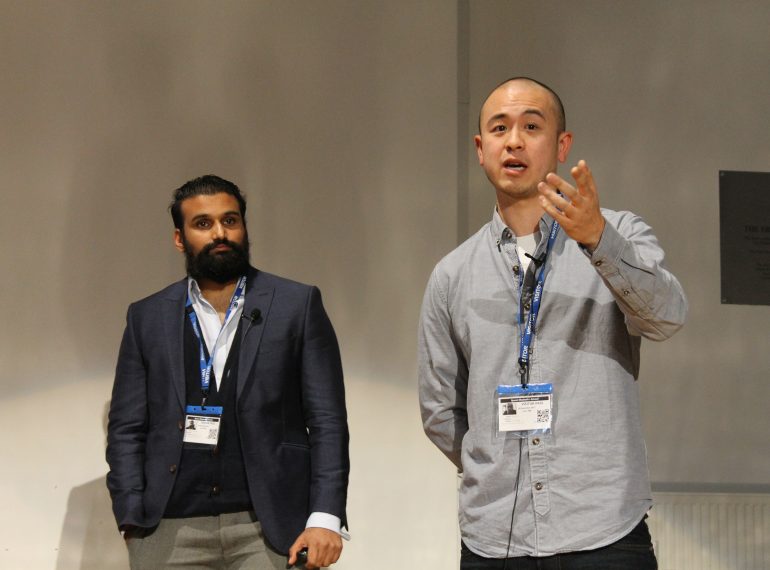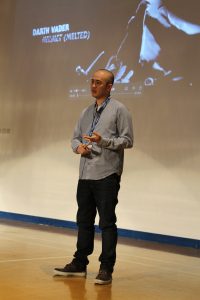
Two Old Elizabethan friends returned to their alma mater to recount an inspirational story of success in the face of extreme adversity.
Johan Byran, who is a successful London GP, has from the age of 18 struggled with the painful and debilitating condition of rheumatoid arthritis, yet this year he completed one of the toughest endurance challenges of them all – the Marathon Des Sa
He was filmed throughout the race by his QE contemporary, Johnny Ho (1997–2004), a professional film-maker who has recently secured investment to complete a documentary about the adventure, to be entitled Grit.
They came to the School to deliver a lecture to senior boys in assembly. The pair addressed themes of taking on challenges, of being resilient – a quality that comes from the experience of testing yourself in uncomfortable environments – and of needing to draw intelligently on the support of a team around you.
Headmaster Neil Enright said: “Johan and Johnny’s account was truly inspiring: I trust our boys will have taken to heart the message that if they have the belief, the persistence and the determination, they, too, can achieve extraordinary things.”
Johan works in a conglomerate of doctors’ practices in Enfield, which is innovating by taking healthcare into the community in places such as gyms. Having been a photographer, Johnny now makes videos, with a portfolio that includes music videos and corporate work for major firms.
Although he continued with his studies and eventually qualified as a doctor, Johan’s condition, which first developed in the summer holidays after he left QE, quickly left him unable to accomplish basic tasks such as getting dressed, nor would he shake people’s hands because it hurt too much. Moreover, the condition took a mental and emotional, as well as a physical, toll. In response, Johan wanted to prove that he could still conquer big challenges.
“I initially had a failure mind-set, but moved to a growth mind-set, where I saw failures as challenges. I decided to do things that I found hard and compete against myself, not others.”
 So he took up long-distance cycling, scuba-diving and marathon-running. And while he did not see himself as competing with fellow participants, he did draw inspiration from them, such as his companion on a bike ride from London to Barcelona – a man who had cystic fibrosis and was on the lung transplant register.
So he took up long-distance cycling, scuba-diving and marathon-running. And while he did not see himself as competing with fellow participants, he did draw inspiration from them, such as his companion on a bike ride from London to Barcelona – a man who had cystic fibrosis and was on the lung transplant register.
He progressed from multiple marathons to Iron Man events, to running 100km to Brighton for his stag celebrations, and ultimately to the Marathon Des Sables. “It was absolutely awful… really hard… and then, for the documentary, after ten hours on the go, Johnny would ask ‘Can we do that last bit again?’ No! But it was part of the process. I had to follow a routine each day, including the filming. It provided structure.

A huge physical challenge for Johan, the event was also tough for Johnny. He had never actually made a documentary before, so had to learn the specific skills involved, as well as coping with 50-degree-plus heat and the challenges posed by sand, including occasional sand storms, which caused problems with the camera equipment. This required plenty of problem-solving along the way.
He, too, drew inspiration from what he saw: “As humans we like things that are comfortable, but these guys are in a place where no one would feel comfortable. But to learn and be successful you have to put yourself in these positions.”
Johnny showed a trailer of the film to the boys and made clear how appropriate its title, Grit, is, given the way Johan had overcome his difficulties.

Johan reinforced Johnny’s advice, saying: “Never look to the side of you, as you’ll only end up keeping up [with others] – you should look ahead of you.” He added that “arbitrary markers of grades or salary are not important for life satisfaction”. Nor was natural aptitude necessarily essential for achieving fulfilment, he said, claiming not to be a great marathon-runner: “I tended only to run when on camera!” Instead, what was important was self-belief – without it, he simply would not be able to run marathons.
